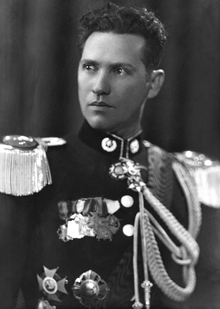

President of Bolivia
23 March 1903 San Javier, Ñuflo de Chávez, Santa Cruz, or El Carmen de Iténez, Iténez, Beni, Bolivia
23 August 1939(1939-08-23) (35) La Paz, Bolivia
13 July 1937 – 23 August 1939
36th President of Bolivia For the Bolivian province, see Germán Busch Province. In this Spanish name, the first or paternal surname is Busch and the second or maternal family name is Becerra. Víctor Germán Busch Becerra (23 March 1903 – 23 August 1939) was a Bolivian military officer and statesman who served as the 36th president of Bolivia from 1937 to 1939. Prior to his presidency, he served as the Chief of the General Staff and was the Supreme Leader of the Legion of Veterans, a veterans' organization founded by him after his service in the Chaco War. Busch was born in either El Carmen de Iténez or San Javier and was raised in Trinidad. He attended the Military College of the Army and served with distinction in the Chaco War. For his actions, he rose to prominence among the high command of the armed forces, participating in the military-led ousters of presidents Daniel Salamanca in 1934 and José Luis Tejada Sorzano in 1936. The latter propelled his mentor, Colonel David Toro, to the presidency of a military junta of which Busch was a member. On 13 July 1937, Busch orchestrated a soft-coup which forced Toro's resignation, elevating himself to the presidency of the junta. A war hero, drawn in by the reformist social movements of the time, Busch spearheaded the development of Toro's military socialist ideology, convening the 1938 National Convention which legally elected him president and promulgated the 1938 Political Constitution, hailed as a "Social Constitution" as it established the State's right to the country's natural wealth, alluded to the social function of property, and recognized the communal lands of indiegenous Bolivians. However, his political inexperience and accustomation to rigid military structure weakened his ability to lead the disparate factions of the left-wing movements and led him to ultimately suspend the legislature and declare dictatorial rule in 1939. During this time, he issued a profusion of executive decrees including a new labor and school code and the mining currency law, the latter of which proved to be the most popular of his policies though it gained him the ire of the Rosca, the country's powerful mining oligarchy. By the end of 1939, pressure from resurgent conservative parties, a corruption scandal, and a deepening personal depression led Busch to commit suicide on 23 August 1939, bringing an end to the era of military socialism in Bolivia. An enigmatic character who came from outside the political realm, he was wrapped in legend and controversy, even about his birthplace. His sudden and unexpected death in office is still disputed as either suicide or an assassination.

We use cookies
We use cookies and other tracking technologies to improve your browsing experience on our website, to show you personalized content and targeted ads, to analyze our website traffic, and to understand where our visitors are coming from. Privacy Policy.